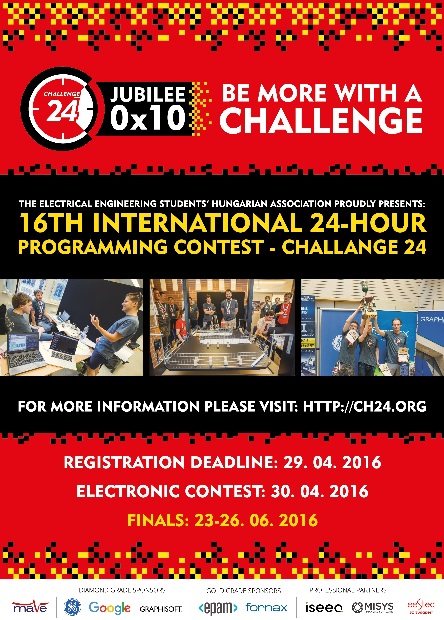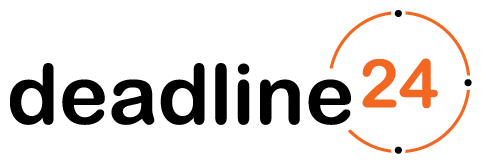Introduction
The International 24-hour Programming Contest, also known as Challenge24, is held every year in Budapest on the last weekend of June or the first weekend of July.Teams of three solve complex programming, artificial intelligence and mathematical problems during the 24 hours of the final round. Challenge24 is one of the few contests where participants are free to choose their tools, platforms and programming languages, and problems are presented only using open file formats.
Solving the problems requires a diverse set of skills including artificial intelligence, algorithm theory, mathematics as well as a background in physics or engineering. Besides the ability to produce working code in short time, good team work and efficient communication are necessary to take up the challenge. Since the tasks are solved under heavy stress, stamina is also an important component of a successful team.
History of Challenge24
Challenge24 started as an invite-only competition with twenty teams in 2000 but rapidly grew into one of the biggest open programming competitions in Europe, attracting hundreds of teams each year. During the past 16 years about 8500 people participated in the challenge.The first 24-hour Programming Contest was organized for Hungarian teams and received 33 registrations from different universities of the country. In contrast, the 12th competition in 2012 had 398 teams from 42 countries, making Challenge24 one of the largest programming competitions in Europe, well known all around the world. Extreme challenge, both for the body and the mind, make this contest popular.
Challenge24 is also recognised by our sponsors - we have had many persistent partners for many years already. In the last two years, the main sponsor of the contest has been SAP Hungary Kft. Fornax (the founder of the competition), Google, NNG and Magyar Telekom have also been sponsors for years.
Challenge24 is acknowledged and supported by the John Von Neumann Computer Society (NJSZT), the Scientific Association for Infocommunications Hungary (HTE) and the Institute of Electrical and Electronics Engineers (IEEE).
Challenge24 is well recognised by contestants whose positive experiences of the event contribute to the popularity and prestige of the contest among programmers worldwide.
As a result, the finest programmers of the world assemble every spring to compete in Hungary, Central Europe.
Target audience
Teams of three may register from any country, without restrictions imposed on age or anything else. Registration starts around the early of December. A wide range of people register, from university students to professional software engineers - all programmers seeking new challenges. Besides Europe, people register from North and South America (the United States, Brazil, Chile, Argentina), from Asia (India, Japan, China) and Africa (the Republic of South Africa, Tunisia, Egypt). Some are experienced participants, who have been competing for years.Most of the tasks require problem solving skills, mathematical knowledge and an affinity to engineering. Many of the tasks explore a specific domain in detail. Being successful in this competition requires a lot more than mere confidence in technical or computer science skills: cooperation and being experienced in diverse topics are also essential. Thus many teams combine the skills of programmers, mathematicians, coders, hackers and engineers.
Motivations
What makes teams want to pack up and fly across oceans to participate in the final round in Hungary? Having consulted many participants, the following reasons are apparent:- an extreme challenge to try their limits and stamina
- exciting problems, complex and sophisticated tasks
- to improve their skills from year to year
- great fun, teamwork and an activity that builds communities
- to learn and gain experience
- a pleasant experience, to be remembered for decades
Partnership
Reasons our partners sponsor the event
- Social responsibility, mutual trust, shared vision about the goals and values of the contest; contributing to further improve Challenge24.
- To represent themselves among other major companies, reaching the best students and future engineers.
- More than a decade of tradition, challenge and recognition by students and professionals; pleasant memories motivate retired contestants to promote the contest among their co-workers.
- Looking to recruit talented young engineers not afraid of challenges in a world where many other companies are competing for those talents.
- A brainstorming session with the task writer team is a great team building event for their employees, where they can try to translate their domain specific problems to a problem in the next round of the contest.
Further partnership
It is important to our sponsors to make the acquaintance of the most talented programmers - whether they are still students, or are already working in the software industry.
We seek our partners for long term cooperation in pursuing our aims. Funds are spent on prizes, rental and other expenses closely related to the contest.







